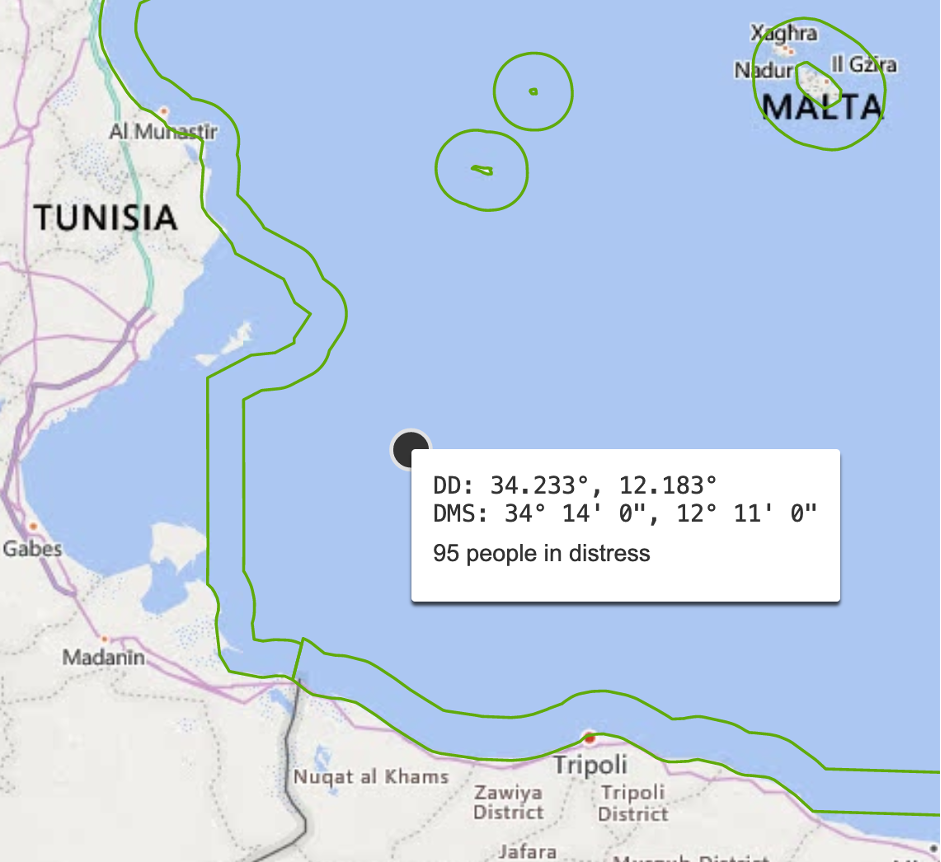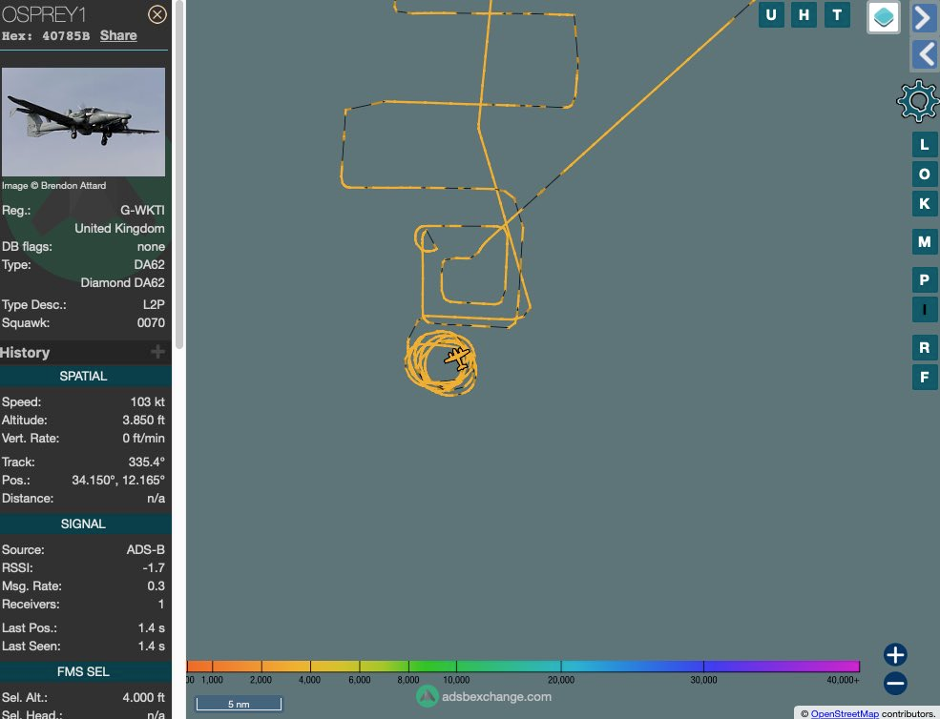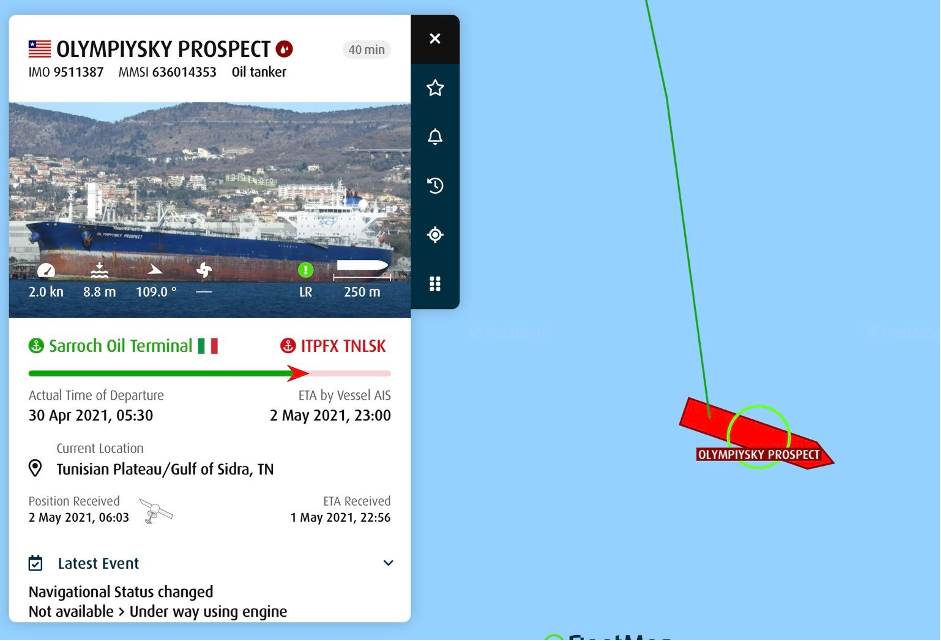How Italy ordered Merchant Vessels to assist in an illegal pullback to Libya
Yesterday, on 2 May 2021, at 05:32h CEST, a group of 95 people on a wooden boat called Alarm Phone. Trying to escape from Libya, they were in urgent distress in international waters, drifting a few nautical miles south of the Maltese Search and Rescue zone (34°14, E12°11 at 05:32h). Their engine was not working anymore and the weather was worsening. The Italian authorities, after the so-called Libyan coastguard had requested their assistance, ordered two merchant vessels, the VOS APHRODITE and the OLYMPIYSKY PROSPECT, to approach the boat in distress and remain on standby, waiting for the arrival of the so-called Libyan coastguard. When the people in distress realised they were going to be returned to Libya, rather than rescued to Italy, the situation on board deteriorated, resulting with several people falling or jumping into the water to prevent capture. Merchant vessels were then asked to rescue the people and to hand them over to the so-called Libyan coastguard, who forcibly returned them to Libya.
While much is known about this violent pullback, many questions remain open: What happened between the arrival of the Merchant Vessels and the arrival of the Libyan authorities? Why did the Merchant Vessels, sent on scene by the Italian coastguard, refuse to rescue a wooden boat that could have capsized at any moment? What happened when the so-called Libyan coastguard arrived on scene? Why did the Merchant Vessels hand the rescued over to the Libyan authorities? Have all the people in distress survived or were there any casualties? Authorities refuse to provide answers to any of these questions. They seek to hide everything that happens in the Central Mediterranean, covering up their crimes at sea.
The case of the 95 people, captured and returned from international waters to Libya after continuously requesting help from European authorities, is a clear example of the complex system of human rights violations of the EU Member States (Italy and Malta) and the EU border agency Frontex. These actors are cooperating and de facto coordinating the activities of the Libyan authorities, who carry out undeclared and illegal border police operations rather than search and rescue activities at sea.
These events show the coordinated and systematic violence of existing Search and Rescue regulations and infrastructures. They show again that States are only protecting borders and refusing to protect people’s lives, by refusing to perform timely rescue and returning people to places where their lives are threatened.
Therefore, it is time for the creation of a Search and Rescue (SAR) coordination centre that intends to prevent illegal pushbacks and death at sea instead of facilitating them. This coordination centre should be organised by civil society: a A Civil Maritime Rescue Coordination Centre (or CMRCC), capable and willing to collect distress calls, to coordinate search and rescue operations to a Place Of Safety (POS), and to work towards the abolition of the EU border regime and its racist violence.
This report provides a detailed timeline of how the events unfolded on 2 May 2021 before showing how this distress case highlights a system of human rights violation in the Central Mediterranean. Crucial elements of this violent system are:the attribution of the SAR zone to Libya, intentional delays in rescue, forms of non-assistance at sea, and routine violations of the Geneva Convention.
TIMELINE
Yesterday, on 2 May 2021, at 05:32h CEST, a group of 95 people on a wooden boat called Alarm Phone. Trying to escape from Libya, they were in urgent distress in international waters, drifting just six nautical miles South of the Maltese Search and Rescue zone (34°14, E12°11 at 05:32h). Their engine was not working anymore and the weather was worsening.
On the phone, the people in distress said:
“We’re nearly 100 people, we are going to die if you don’t help us. Please! The engine stopped. Can you imagine if you’ve children & you feel they are going to die in the sea. It’s so hard. There are big waves and the boat is too small. We are on a small boat. We will die if you don’t help us. Please send someone for us, there is a lot of water coming into the boat.”
Alarm Phone immediately alerted all authorities (at 06:12h). Subsequently Alarm Phone emailed the Shipping Company of Merchant Vessel Olympiski Prospect, informing them of their duty to rescue (06:37h), as it was close to the boat in distress. However, during a later phone call, they refused to accept their obligation to render assistance. In the meanwhile, several friends and relatives of the people in distress got in touch with Alarm Phone via Social Media and asked for the fate of the people on board.
At 9.17h, Mediterranea Saving Humans asked Italian MPs to request Italian authorities to release information on the distress situation and to demand immediate rescue.
At 10.12h, the people in distress told Alarm Phone that an airplane was flying above them. Alarm Phone could confirm that it was Frontex’s Osprey 1 which was visibly circling above the boat. According to the people in distress, it remained on scene for about one hour before taking off.
At 11:30 h, when contacting Italian authorities, Alarm Phone was told to contact the Libyan authorities instead. When contacting the Libyan authorities, however, Alarm Phone was told that they could speak only Arabic, so no communication was possible at the time.
At 13.49h, a source within the Italian Ministry of Defense responded to Italian MPs, explaining that they were coordinating an intervention with the so-called Libyan coastguard, and that Libyan authorities were responsible for the distress case. Soon after, at 14.46h, the Italian Ministry of Defense communicated that two merchant vessels had been alerted.
According to a press release by the Italian Coastguard[1], published at 15.37h, the so-called Libyan coastguard had requested operational support as, due to bad weather, they were unable to intervene. The Italian coastguard then alerted two merchant vessels in the vicinity: on vesselfinder Alarm Phone could identify the VOS Aphrodite (Merchant Vessel, Flag Gibraltar); Olympiysky Prospect (Tanker, Liberian Flag), which, according to the people on board, approached the boat in distress but did not provide any assistance.
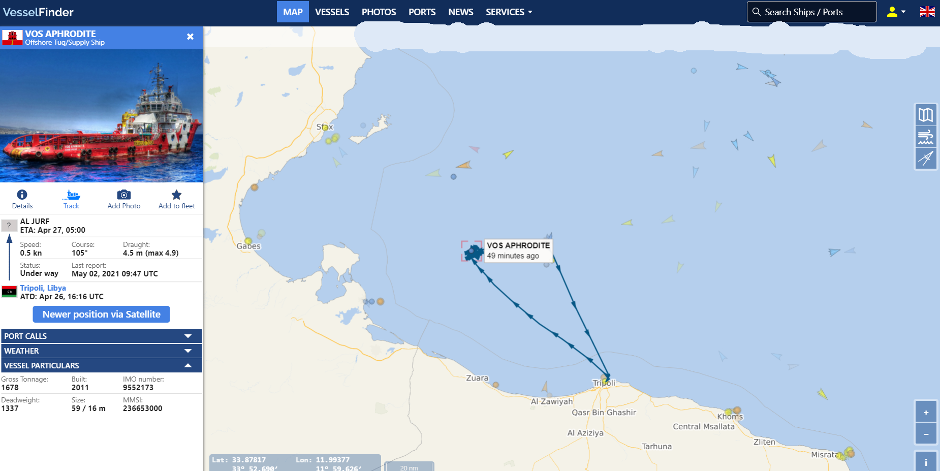
At 14:41h, Alarm Phone sent an email to all authorities and the Merchant Vessels on scene, informing them that the people in distress could see two vessels. Soo after, at 14:55h, the so-called Libyan coastguard responded to the email announcing they were “in charge of the operation with the collaboration of MRCC Rome”.
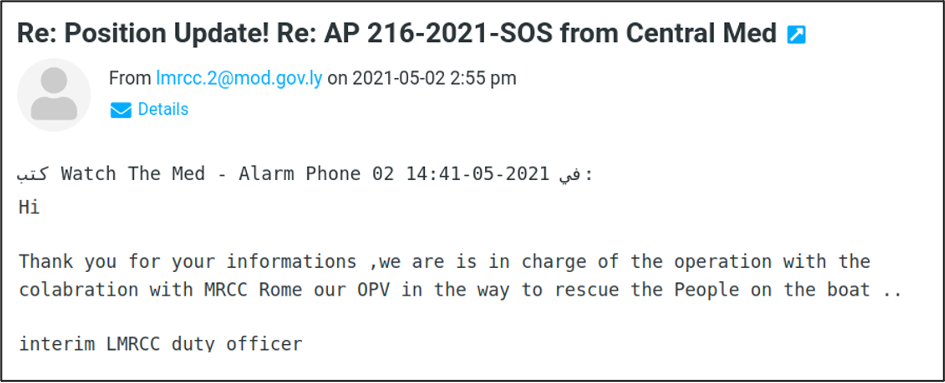
The people in distress were panicking on the phone, asking Alarm Phone why the Merchant Vessels were sent and if they were only sent to watch them die. Water kept coming into the boat, and the people on the lower deck were moving to the upper deck, destabilizing the boat further. When the people in distress realised that the Merchant Vessels were just waiting for the Libyan authorities to arrive and to return them to Libya, the situation on board turned even more critical, with people panicking and threatening to jump into the sea and to swim towards the Merchant Vessels. On the phone, they said:
“We prefer to die, than to be taken back to the Libyan hell – we risked our lives to escape, we have been at sea for so many days, we need to go to Italy now.”
The situation on board indeed quickly deteriorated, resulting in several people falling or jumping into the water to prevent capture. Merchant vessels were then asked to rescue the people but to then hand them over to the so-called Libyan coastguard upon their arrival.
At 17.15h, Italian MPs communicated to Italian authorities that the situation on board was extremely critical, that the arrival of Libyan authorities at the scene of distress might endanger the people even further, and that the people on board should have the right to apply for asylum in Europe. The MPs argued that not only the Libyan authorities would violate the Geneva Convention but also all those who monitor and witness this human right violation without intervening.
At 20.04h, the Italian Ministry of Interior informed MPs that the so-called Libyan coastguard was on scene, and that, since the so-called Libyan coastguard was responsible for the operation, Italy could not intervene. Sea-Watch4 then overheard communication on VHF suggesting that the VOS APHRODITE was cooperating with the Libyan authorities in organising an illegal pull-back to Libya.
Hours later, on 3 May 2021, the UNHCR confirmed that 95 people had been returned to Libya by the so-called Libyan coastguard.
SYSTEMATIC HUMAN RIGHTS VIOLATIONS OFF LIBYA’S SHORE
The illegal pullback to Libya on 2 May clearly shows how EU Member States (Italy and Malta) and the EU border agency Frontex cooperate and de facto coordinate human right violations by Libyan authorities. This pull-back system is premised on several interrelated violations:
1) The attribution of the SAR zone to Libya is in open violation of the 1979 Hamburg Convention and the IOM Guidelines on SAR zones. In fact, Libya has neither the means nor the personnel able to manage the largest SAR zone in the Mediterranean. In particular, it cannot provide shipwrecked people with a PoS (Place of Safety), a fundamental characteristic of rescue operations at sea. Any state that is a signatory to the Hamburg Convention cooperates with or coordinates the activities of Libyan assets at sea is in open violation of the Hamburg Convention, unless it ensures that people are taken to a PoS after they have been recovered at sea.
2) Italian and European authorities, together with Frontex, delay rescue. In the case of the 95 people in distress, Italy, despite having promptly received notice of the case and despite having precise information on the dangerous situation for the persons at sea, and in light of Libyan communication on the “immediate impossibility of intervening due to adverse weather and sea conditions”, decided not to send rescue. Instead, the Italian MRCC ordered Merchant Vessels to “wait for the Libyans”.
3) The current case also violates the Geneva Convention (art. 33). Whilst those who use immigration control legislation in opposition to international conventions on human rights and the obligation to rescue would define the people in distress as “migrants in transit”, the 95 people adrift at sea were people fleeing Libya, a country where they are subjected to severe violence. They require international protection, regardless of their country of origin. Preventing them to apply for asylum and returning them to the place from which they are fleeing is a crime against humanity. Coordinating who is chasing them, providing their whereabouts while they are trying to escape from their captors, as the European agency Frontex has been shown to do in this case as well, is in open violation of the Geneva Convention, signed by European states.
EU member states and agencies act in clear violation of human rights. It is time for civil society to coordinate search and rescue activities: A Civil Maritime Rescue Coordination Centre (or CMRCC) capable of responding adequately to distress cases and able to coordinate searches and rescue activities up to disembarkation at a POS. A CMRCC that is composed of a wide network of diverse civil society actors and that is willing, and able, to rescue – something that EU member states fail to do in their quest to prevent human beings from reaching safety in Europe, no matter the cost.
[1] Comunicato stampa rilasciato dalla Guardia Costiera italiana:
Migranti: barca davanti a Libia, G.Costiera invia mercantili A bordo 97 persone, Marina libica non e’ riuscita ad intervenire (ANSA)
ROMA, 02 MAG – Due navi mercantili sono state inviate dalla Guardia Costiera italiana in soccorso di una barca di legno con migranti a bordo, segnalata davanti alle coste libiche. E’ quanto rendono noto fonti della Guardia Costiera, in merito alla segnalazione pervenuta da un cittadino libico e da Alarm Phone circa la presenza di un’imbarcazione in legno partita ieri sera da Zuara, con circa 97 persone a bordo. Il barcone, in effetti, e’ stato avvistato da un velivolo Frontex alla deriva in area di responsabilita’ Sar libica. La Guardia costiera libica, che ha assunto il coordinamento dell’evento Sar, ha inviato una propria motovedetta che non e’ riuscita a raggiungere il punto a causa di avverse condizioni meteo marine, spiegano le stesse fonti. La stessa Guardia costiera libica ha chiesto, successivamente, la collaborazione della Guardia Costiera italiana al fine di dirottare i mercantili piu’ vicini, secondo quanto previsto dalle convenzioni internazionali in materia ricerca e soccorso in mare. La Centrale Operativa della Guardia Costiera italiana ha cosi’ individuato, grazie ai sistemi di monitoraggio, le due unita’ piu’ vicine al punto di avvistamento del velivolo Frontex. Le unita’, un supply vessel e una petroliera, coordinate dalle autorita’ libiche, giungeranno nelle prossime ore sull’ultima posizione nota dell’imbarcazione riferita dal velivolo Frontex. (ANSA).
